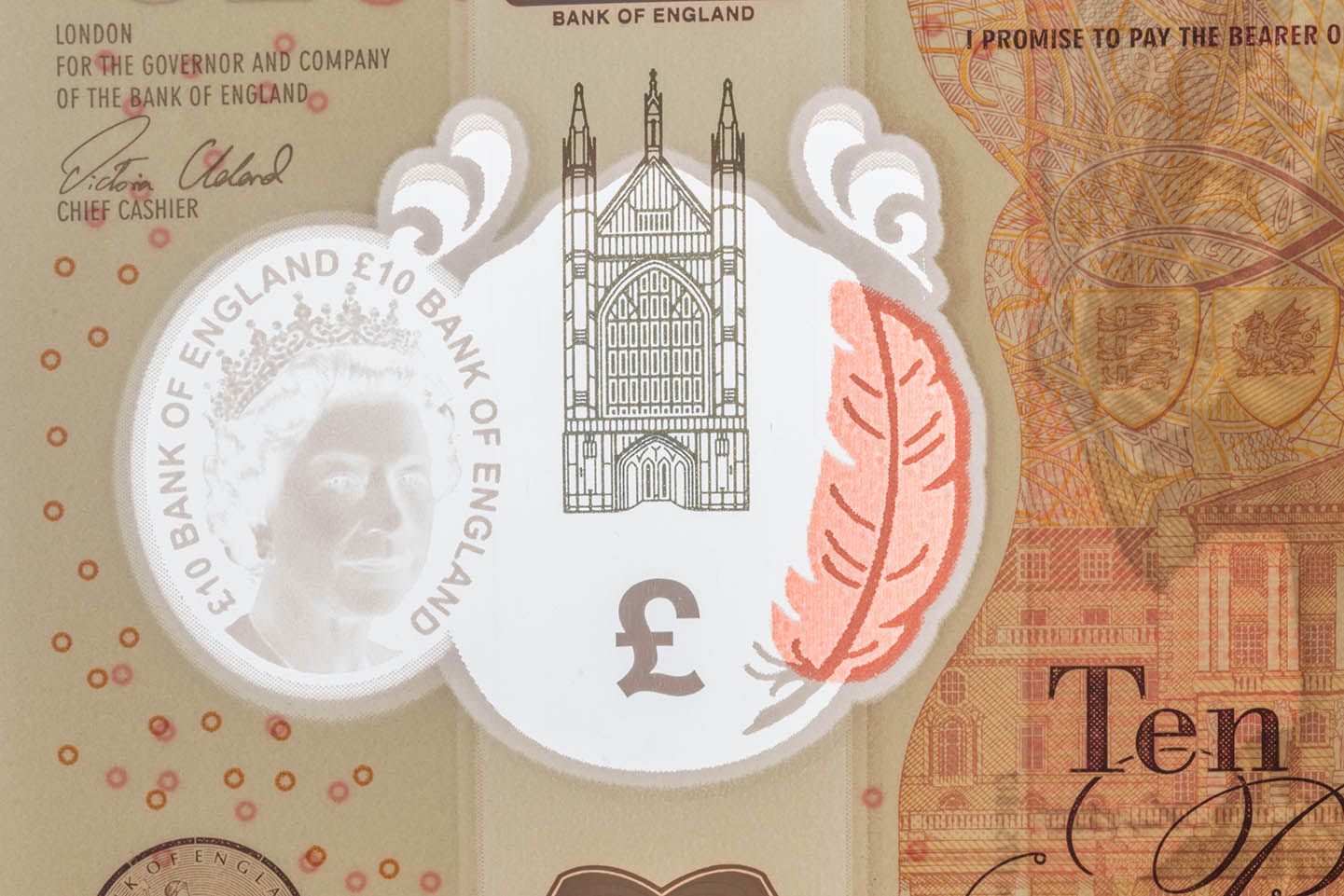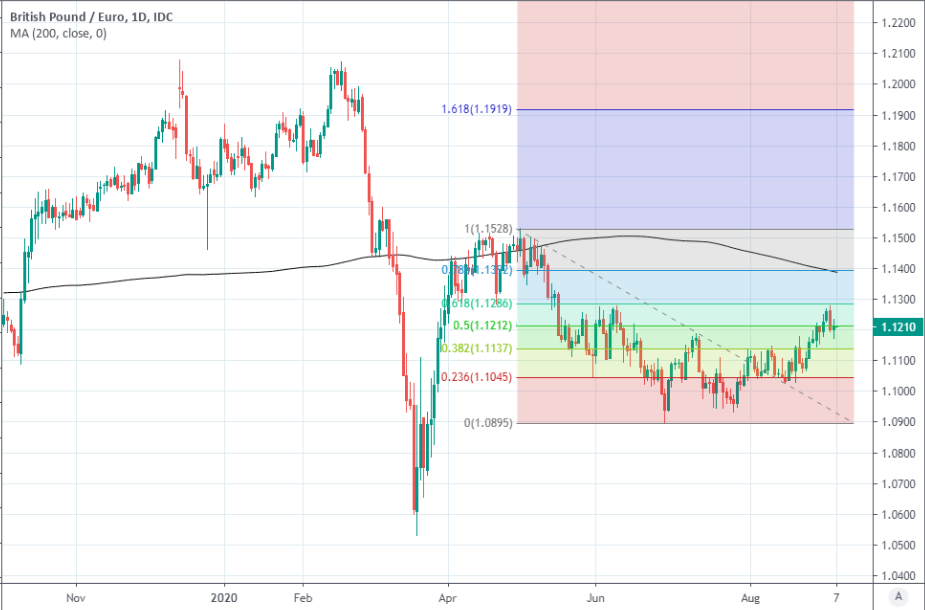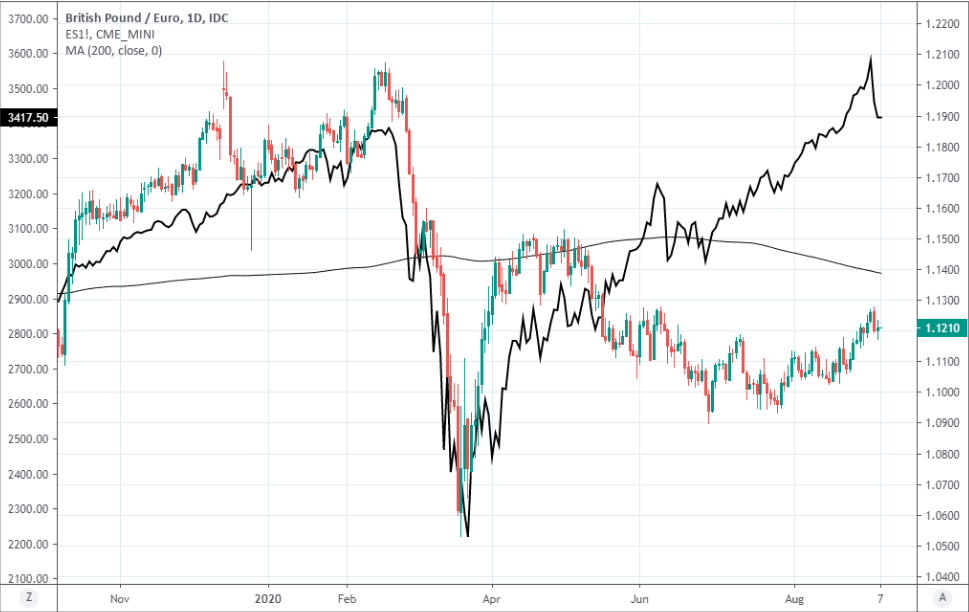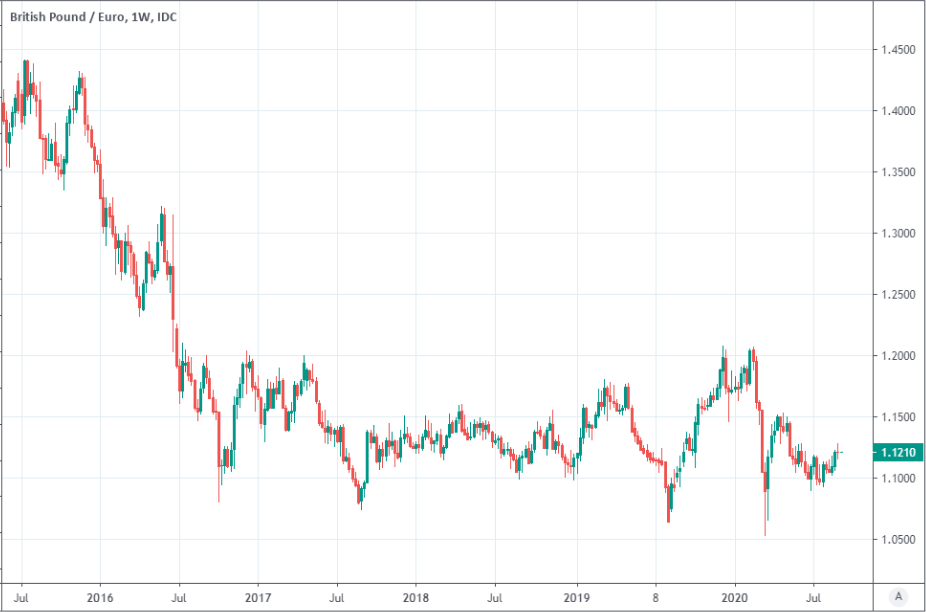Pound-Euro Week Forecast: Technical Analysts Warn of Setback with Brexit and ECB Under Spotlight
- Written by: James Skinner
- Analysts eye fall to 1.11 as Brexit talks resume, stocks wobble.
- But ECB's concern over EUR strength may support GBP/EUR.
- ECB meeting, risk appetite, UK GDP data all ahead this week.
Image © Adobe Images
- GBP/EUR spot rate at time of writing: 1.1182
- Bank transfer rate (indicative guide): 1.0890-1.0970
- FX specialist providers (indicative guide): 1.1011-1.1080
- More information on FX specialist rates here
Pound Sterling starts the new week softer against the Euro having declined a mere 0.1% in the week prior, suggesting this market is starting to consolidate ahead of its next major directional move.
We will these week be looking for the catalyst for such a move to come in the form of news concerning the state of Brexit trade negotiations, global stock market trends and the European Central Bank's policy event due on Thursday.
Sterling gains at the start of last week but these were handed back on Thursday as global investor risk appetite faltered sending some stock markets and some major currencies corrected lower. Sterling tends to decline against the Euro, Dollar, Yen and Swiss Franc when markets are selling off, and therefore how markets trade this week could be key.
Thursday's loss scuppered what would otherwise have been a hat-trick of weekly advances and also prompted some technical analysts to abandon earlier bullish wagers on the Pound, although others are suggesting that only a temporary setback is likely.
The Pound-to-Euro rate rose as high as 1.1279 last week, marking two month highs for Sterling and lows for the single currency, after establishing a technical bottom on the charts in earlier weeks.
However, David Sneddon, head of technical analysis at Credit Suisse says the British currency could now face a period of consolidation after failing to break above there on the first asking, but that it should eventually retest the 1.14 level.
Above: Pound-to-Euro rate at daily intervals with Fibonacci retracements of May fall and 200-day moving average (black)
Others are less optimistic and have abandoned earlier bullish bets on Sterling in favour of an anticipated dip against the Euro back below 1.11.
Karen Jones, head of technical analysis for currencies, commodities and bonds at Commerzbank, says the Pound-Euro rate has failed to break above the 1.1282 9th June High and has "chartered a key day reversal" which implies a loss of upside momentum and scope to give back some of the recent gains.
Key support is seen by Jones to be at 1.1063 which could limit downside, ahead of 1.0930/1.0895.
The charts are warning of a dip lower just as the Brexit negotiations near the final stretch. The second from last round of talks begins Tuesday and analysts as well as the wider market are downbeat on the prospects of a breakthrough.
British negotiator David Frost said in a weekend interview with a local newspaper that the UK would not become a "client state" and claimed the government isn't afraid to opt for a so-called Australia deal Brexit if the EU proves unable or unwilling to rethink some of its red lines.
Frost spoke of the need to change the European perception that Downing Street might be in the market for compromise on its red lines around fishing rights and the so-called level playing field agreement, which he attributed to the previous May government's tendency to compromise in the early stages of the process.
"There must be a non-zero probability that Brussels will propose fish passports," says Stephen Gallo, European head of FX strategy at BMO Capital Markets. "The slide in EURGBP to the recent low of 0.8866 should be treated with caution ahead of autumn ugliness."
(If you would like to lock in today's rate for use in coming weeks and months, thereby protecting your budget, please read here).
Frost's interview was revealed as The Telegraph suggested European leaders may seek a greater involvement in the talks from late September onward although it's not clear if this means a change of stance in Brussels on key issues. The two sides are thought to have until mid-October to reach a deal.
Above: Pound-to-Euro rate shown at daily intervals alongside S&P 500 (black line, left axis).
"Our economists expect Brexit negotiations to conclude with a “thin” free trade agreement, including a lengthy implementation phase during which some current EU-UK arrangements are preserved—i.e., in data, aviation and security—and the imposition of significant barriers to trade in services is gradual. Under this outcome, Brexit-related risk premium in Sterling should decline, and we forecast that EUR/GBP will edge down to 0.87. But until more clarity emerges from Brexit talks and the health of the domestic economy, we would likely avoid Sterling longs," says Karen Reichgott Fishman, a strategist at Goldman Sachs, tipping the Pound for a return to 1.1388 in the coming months.
Investors have so-far been content to ignore an absence of progress in the Brexit talks although many analysts expect that, with the deadline for a deal approaching, the prospect of a return to tariff and non-tariff barriers could soon begin to weigh on the Pound. However, other factors will also matter too in the short-term including the trajectory of stock markets, which GBP/EUR tends to follow, developments at the ECB and UK GDP data due out on Friday.
A continuation of last week's softness in stock markets might be a weight around the ankles of Sterling although the Euro will also face headwinds in the coming days and most notably, from the ECB. The bank will announce its next policy decision at 12:45 on Thursday before setting out the rationale for it in a 13:30 press conference and investors will on the lookout for comments about the 12% Euro-to-Dollar rate rally from 1.08 in late May.
"FX markets have been further rattled by recent comments from the ECB’s chief economist as well as media reports hinting at growing unease at the Governing Council about the EUR strength of late. Coupled with the latest disappointing Eurozone data, this could mean that next week the ECB can signal a more cautious outlook, highlight its ability to ease further if needed and even jawbone the EUR," says David Forrester, a strategist at Credit Agricole CIB.
Above: Pound-to-Euro rate shown at weekly intervals.
"Given recent EUR appreciation has not affected market inflation expectations, we do not think a rate cut is likely at this meeting, but would not rule one out later. In any case, the direction of travel of the economy is not reassuring, and any extension of the latest trends would likely support more easing by yearend, most likely in December, before fiscal support kicks-in in 2021," says Christian Keller, head of economics research at Barclays. "We expect GDP to continue to recover, albeit at a somewhat slower pace in July (+6.0%m/m, -12.2%y/y) given progress made in previous months."
Euro-to-Dollar rate strength has, when combined with moves elsewhere, lifted the trade-weighted single currency to levels that are potentially problematic for the Eurozone economy. But GBP/EUR losses would lift the trade-weighted Euro further and so might be limited, if not unlikely while the ECB is on the warpath.
Policymakers made their objections to a continued rally in the currency clear last week, although there's uncertainty over exactly what the bank could do to deter investors from buying the Euro.
Rising exchange rates disadvantage a country's exports by making them more expensive to buy while complicating the work of inflation targeting central banks given that stronger currencies reduce import costs and eventually, inflation.
Any ECB comments that weigh on EUR/USD could provide support to the Pound-to-Euro rate late this week ahead of July GDP data due out at 07:00 on Friday. The market is looking for the economy to have rebounded by 6.6% that month and Sterling could be sensitive to any disappointment.
"What strikes us is how divergent the EUR's broad rally is with the economic backdrop in the Eurozone. While the markets might be ignoring this for now, at some point, it will matter and the dissonance will be deafening," says Dominic Bunning, a strategist at HSBC in a research note. "In an economy deep in recession and facing deflationary pressures, the EUR's strength is creating much tighter financial conditions than would otherwise be in place. The market may not care about this disconnect for now, but it creates a big headache for the ECB. Through analysing the raw text of ECB communication we see that the ECB is referring to financial conditions more than ever before."







